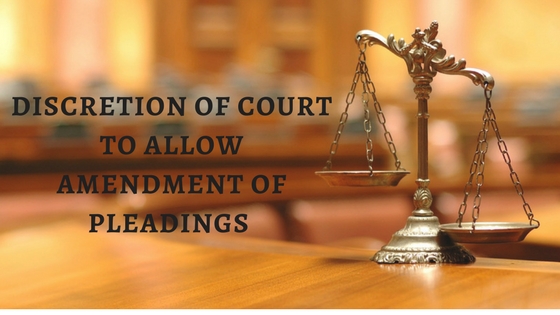Aapka Consultant Judgment Series- In this series, we are providing case analysis of Landmark Judgments of Hon’ble Supreme Court of India.
M/s. Ganesh Trading Co. v. Moji Ram
AIR 1978 SC 484, [1978] 2 SCC 91JUDGES: M. Hameedullah Beg and D.A. Desai
Date of Decision: 25-01-1978
FACTS:-
The appellant-plaintiff firm filed a suit through its partner, for the recovery of the amount due on a promissory note to the respondent. After written statement was filed, plaintiff applied for an amendment of the plaint on the ground of inadvertently omission to mention the material fact that the firm had actually been dissolved before the institution of the suit so as to enable the court to consider and decide the subject matter of the suit in its true perspective and to meet ends of justice. The trial court and the High Court, in revision, refused to allow the amendment on the ground that it would amount to the introduction of a new time barred cause of action. Hence, appellant-plaintiff challenged this imp order before the Hon’ble Court.
ISSUE:-
Whether the application to amend the plaint, inadvertently omitted, should be permissible under Order VI Rule 17 of the Code?
JUDGMENT:-
The Hon’ble Supreme Court stated that procedural law is intended to facilitate and not to obstruct the course of substantive justice. In general, provisions relating to pleading in civil cases are meant to give to each side intimation of the case of the other, to enable courts to determine what is really at issue between parties, and to prevent deviations from the course which litigation on particular causes of action must take. Order VI provides for such provisions relating to special cases and circumstances, and for signing, verification and striking out of pleading and amendment of pleadings. On mere reading of Order VI Rule 17, it was clear that the provisions for the amendment of pleadings, subject to such terms as to costs and giving of all parties concerned necessary opportunities to meet exact situations through amendments as intended to promote the ends of justice and not for defeating them. If any essential fact is lacking from averments in the plaint the cause of action will be defective. Defective pleadings are generally curable if introduce indirectly, through an amendment of his pleadings, an entirely new or inconsistent cause of action; it is only if lapse of time has barred the remedy on a newly constituted cause of action that the Courts should, ordinarily, refuse prayers for amendment of pleadings.
In light of the relevant provisions of Order VI of the Code and various judicial pronouncements, the Hon’ble Court concluded that the mere specification of the capacity of the appellant in which the suit was filed could not change the character of the suit. Further, lack of essential fact in the plaint, will defect the cause of action but this does not constitute a new cause of action. Therefore, it brings out to the conclusion that the amendment may be allowed if it is made without causing injustice to the other party subject to conditions such as payment of costs. The amended sought by the appellant will only brings out the original capacity of the party suing. The character or identity of the appellant will remain the same.
Thus from the above observation, the Hon’ble Court allowed the appeal to amend the plaint and accordingly set aside the order of the sub courts.
HELD:-
Hence, the Hon’ble Court held the application for amendment in the plaint under the Order VI Rule 17 of the C
To Get Legal Opinion from Advocates/ Legal Experts, Please click here
To Get Legal Opinion from Retired Hon’ble Judges, Please click here












